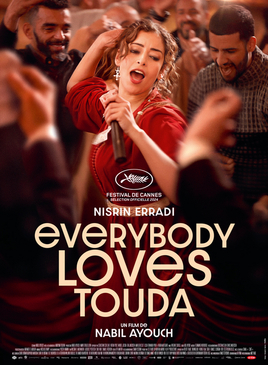Related Research Articles

Nabil Ayouch is a Franco-Moroccan television and film director, producer, and writer. His films have screened at international film festivals including the Cannes Film Festival and Montreal World Film Festival.

Mahi Binebine is a Moroccan painter and novelist born in Marrakech in 1959. Binebine has written six novels which have been translated into various languages.

Chaïbia Talal was a Moroccan painter.

Cinema of Morocco refers to the film industry of Morocco. Aside from Arabic-language films, Moroccan cinema also produces Tamazight-language films.
Mohammed Kaghat (1942–2001) was a Moroccan playwright, actor and stage director. He also directed several feature films and wrote several books on drama and theater in Morocco.
Nabyl Lahlou is a Moroccan theater director, author and actor, known for being an innovative theater and film director, and is considered one of the most influential Moroccan theater directors of the 1980s.

Ahmed Boulane is a Moroccan film director, producer and screenplay writer. Known as l'enfant terrible du cinéma marocain for his antics with journalists and his fellow filmmakers, he is considered to be one of the most talented directors in Morocco.

Razzia is a 2017 Moroccan drama film directed by Nabil Ayouch. It was selected as the Moroccan entry for the Best Foreign Language Film at the 90th Academy Awards, but it was not nominated. Razzia is mostly set in Casablanca and characters frequently discuss the 1942 film Casablanca.

Hicham Lasri is a Moroccan comics artist, film director, novelist, producer and screenwriter. He has a special imprint on Moroccan cinema, as his films often deal with topics that are considered taboo in Moroccan society with great boldness.
Dalila Ennadre was a Moroccan film director.
Casablanca Beats is a 2021 Moroccan drama film directed by Nabil Ayouch. In June 2021, the film was selected to compete for the Palme d'Or at the 2021 Cannes Film Festival. The film was produced by Ali n' Productions. It is reportedly the first Moroccan film to be selected to compete for the Palme d'Or since 1962. The film was shot at Les Etoiles de Sidi Moumen, a cultural centre that director Ayouch co-founded with Mahi Binebine in 2014. It was selected as the Moroccan entry for the Best International Feature Film at the 94th Academy Awards.

Mohamed Mustapha Tabet, known by his nickname Hajj Hamid or Hajj Tabet, was a Moroccan serial rapist and former police commissioner who was allegedly involved in the kidnapping, rapes and assaults of more than 518 girls and women in his Casablanca apartment from 1986 to 1993.
Anas Basbousi known artistically as Bawss, is a Moroccan actor and rapper. He is best known for his role in Nabil Ayouch's 2021 film Casablanca Beats, which was selected to compete for the Palme d'Or at the 2021 Cannes Film Festival.
Abdelilah Basbousi is a Moroccan actor. He is best known for his role in Nabil Ayouch's 2021 film Casablanca Beats, which was selected to compete for the Palme d'Or at the 2021 Cannes Film Festival and his the brother of Anas Basbousi the well known actor in the artistic name of Bawss.
Samah Barigou is a Moroccan actress. She is best known for her role in Nabil Ayouch's 2021 film Casablanca Beats, which was selected to compete for the Palme d'Or at the 2021 Cannes Film Festival.
Hassan Benjelloun is a Moroccan screenwriter, director and producer. He is best known for his 2007 comedy Where Are You Going Moshé?.
The Years of Exile is a 2002 film directed by Nabyl Lahlou. Adapted from the novel Une enquête au pays by Driss Chraîbi, this film shows the resistance of Berber villagers in the High Atlas against the representatives of the Moroccan administration in the 1960s.
Tabite or Not Tabite is a 2005 Moroccan drama film directed by Nabyl Lahlou. The film was inspired by the trial of Mohamed Tabet. Tabet's family filed a complaint to prohibit the preview of the film. Summoned to court in Rabat, the director successfully pleaded his case himself, arguing that it was his duty to make films about this period. The preview was ultimately held at the Mohamed V Theater in Rabat.
Fatima Boubekdi is a Moroccan filmmaker, screenwriter, dramatist. She studied film directing in Morocco, graduating from the ISADAC. She is known for her works that draw inspiration from Moroccan folklore.

Everybody Loves Touda is a 2024 drama film directed, co-written and co-produced by Nabil Ayouch from a screenplay he wrote with Maryam Touzani. The film stars Nisrin Erradi as a young singer who dreams of becoming a traditional Moroccan folk singer and moving to Casablanca for greater recognition and a better life for her son. It is a co-production between Morocco, France, Belgium, Denmark, the Netherlands and Norway.
References
- ↑ "Amal Ayouch". AlloCine. Retrieved 13 October 2018.
- ↑ Bouhrara, Imane (15 March 2007). "Amal Ayouch, l'artiste philosophe" (in French). Maghress. Retrieved 13 October 2018.
- 1 2 "Amal Ayouch primée au Festival du film des femmes africaines de Brazzaville" (in French). AtlasInfo. 15 January 2015. Retrieved 13 October 2018.
- ↑ Jadraoui, Siham. "Fondation des arts vivants : du théâtre pour les quartiers défavorisés" (in French). Aujourd'hui. Retrieved 13 January 2010.
- 1 2 3 4 "Amal Ayouch : La comédienne militante". L'opinion. 25 May 2011. Archived from the original on 13 October 2018. Retrieved 13 October 2018.